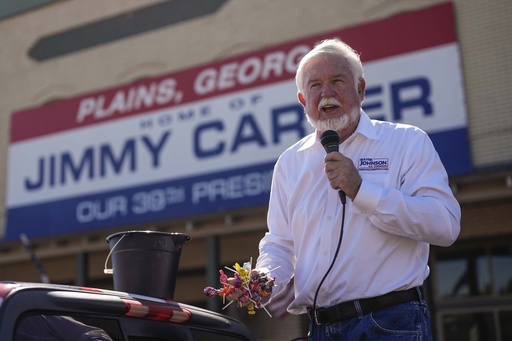
ATLANTA — By closely aligning himself with Donald Trump, Brian Jack has emerged as the Republican candidate for Georgia’s 3rd Congressional District, and he is sticking to this strategy as he prepares to face Democrat Maura Keller.
During a recent debate hosted by the Atlanta Press Club, Jack highlighted his collaboration with Trump six times in thirty minutes, showcasing his loyalty to the ex-president who has voiced continuous support for him, most recently during a speech in Atlanta.
In Georgia, both major political parties are vying for all 14 congressional districts, with Republicans maintaining a 9-5 majority. Besides the 3rd District, one particularly noteworthy race is in the 2nd District, where Republican Wayne Johnson is challenging long-term Democrat Sanford Bishop.
With no major statewide elections on the agenda, the presidential race is consuming Georgia’s political landscape. Bishop and other incumbents are prioritizing their endorsement of presidential candidates rather than focusing exclusively on their own re-election bid, especially since many districts have become less competitive due to a court-ordered redistricting that occurred in 2023.
When asked during the debate if he disagreed with Trump on any issues, particularly regarding Trump’s actions during the Capitol riot on January 6, 2021, Jack instead insisted that electing him should be seen as part of a collective effort to reinstate Trump’s policies — particularly around the economy, immigration, and safety.
“I’m incredibly proud of what we accomplished together,” Jack asserted.
This strategy appears to be a sound one for the 36-year-old from Peachtree City, who previously worked with former House Speaker Kevin McCarthy following Trump’s administration. The 3rd District, which stretches from Carrollton to Columbus and extends into Atlanta’s southern suburbs, is an open seat due to the retirement of incumbent Republican Drew Ferguson. Historically, Republicans have secured around two-thirds of the votes in this district, according to estimates from the Princeton Gerrymandering Project.
Keller, Jack’s opponent from the Democratic Party, is a retired lieutenant colonel from the Army and a resident of Fayetteville, advocating for abortion rights, improved services for veterans, and increased wages.
“I am a common-sense candidate with common sense policies and I am respectfully asking for your vote,” Keller said in the debate. “Unlike my opponent — who only prioritizes Donald Trump and his extreme agenda — I have served this community for 28 years, and my focus will always be on you.”
Turning to the 2nd District, Republicans were optimistic about dethroning Bishop last year, but he won his 16th term comfortably with 55% of the votes. Johnson, who held a role in Trump’s U.S. Department of Education, emphasizes economic advancement for this district, which encompasses 30 counties across southwest Georgia and includes cities like Columbus and Macon.
“Why would people believe that giving you two more years will yield improvements, considering the past three decades?” Johnson posed rhetorically during a debate, where Bishop was absent.
Johnson advocates for federal subsidies that would allow individuals to make a home purchase with a $1,000 monthly payment and a vehicle purchase with a $200 monthly payment. He positions himself as moderate on abortion but acknowledges that Georgia’s current restrictions, which prohibit most abortions following fetal cardiac activity, are “close to getting it semi-right.”
Bishop also touts his moderate stance, catering to white farmers who are crucial to the rural economy and supporting military facilities in the region. He emphasizes his legislative successes and seniority in Congress, benefiting from substantial federal funding.
During the campaign, Bishop has not refrained from engaging in more partisan rhetoric. While Johnson debated an empty podium in Atlanta, Bishop was supporting Democratic nominee Kamala Harris alongside former President Bill Clinton and described the election as a choice between “good or evil,” stressing that Republicans would dismantle essential services like the Department of Education.
In addition to the Bishop race, incumbents across various congressional districts are also prioritizing the presidential campaign. Notably, Republican Marjorie Taylor Greene appears to be sidelining her opponent, Democrat Shawn Harris, in the 14th District, while first-term incumbent Republican Mike Collins focuses his efforts outside Georgia instead of campaigning against Democrat Lexy Doherty in the 10th District.
Other Democratic candidates face challenges in their respective districts, like Liz Johnson against Republican Rick Allen in the 12th District, and Patti Hewitt battling Buddy Carter in the 1st District. There are also longshot Democratic candidates, such as Darrius Butler facing incumbent Austin Scott in the 8th District and Tambrei Cash up against Andrew Clyde in the 9th District.
On the Republican side, longshot candidates include Eugene Yu competing against Hank Johnson in the 4th District and John “Bongo” Salvesen in the 5th District challenging Nikema Williams. Democratic incumbents Lucy McBath and David Scott, however, are positioned favorably in their districts, facing Republican challengers in what are anticipated to be less competitive general elections.
As the races progress, it remains to be seen how the intertwining dynamics of local and national politics will influence the outcomes for candidates in Georgia.
